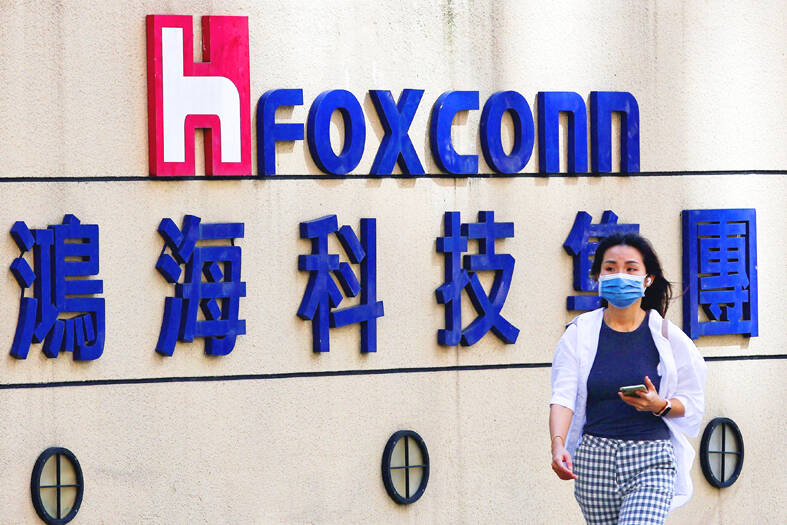Hon Hai Precision Industry Co (鴻海精密), a major iPhone assembler and supplier of artificial intelligence (AI) servers powered by Nvidia Corp’s chips, yesterday posted an annual decline in revenue of 9.6 percent for last quarter due to lower smartphone shipments, matching a company estimate last month.
Revenue dropped to NT$1.32 trillion (US$41.18 billion) last quarter, compared with NT$1.46 trillion in the first three months of last year.
On a quarterly basis, revenue plunged about 28.65 percent in the traditionally slack season.

Photo: Ann Wang, Reuters
The performance was “in line with the company’s outlook [given] at the earnings conference,” Hon Hai said in a statement.
The company attributed the declines to a higher base in the prior year as smartphone production and shipments were postponed to the first quarter of last year from the final quarter of 2022 after a surge of COVID-19 cases in China temporarily halted operation of its Zhengzhou factory, an iPhone manufacturing hub of Hon Hai.
Significant growth in component and cloud-based product segments — primarily servers — helped offset weakness in networking devices amid an ongoing inventory correction cycle, Hon Hai said in a statement.
PC revenue was little changed from a year earlier, with demand remaining lukewarm.
Hon Hai expects an annual and quarterly revenue growth this quarter, traditionally an off-peak season.
Major products are entering a period of transition between old and new, it said.
Visibility is largely in line with market expectations, it said.
For the full year, Hon Hai said it expects revenue to grow significantly, fueled by strong AI server demand, an upward revision from a “neutral” outlook in November last year.
The company said it expects revenue from AI servers to surge 40 percent year-on-year this year, boosting revenue contribution to about 40 percent of its total server revenue, from 30 percent last year.
Hon Hai’s AI server revenue is likely to account for 18 percent of its overall revenue next year due to a rising share of shipments to Nvidia, JPMorgan analysts including Gokul Hariharan wrote in a note late last month.
Still, with Apple’s business making up more than half of Hon Hai’s revenue, there are challenges that remain.
iPhone shipments in China fell 33 percent in February to about 2.4 million, official data showed.
To stimulate demand, Apple even rolled out rare discounts on its Web store in January, while online resellers are cutting prices by as much as US$180.
Hon Hai is to release detailed financial figures and give its business updates on May 14.
Hon Hai said it did not expect any significant financial impact from the magnitude 7.2 earthquake that struck Taiwan on Wednesday.
Additional reporting by Bloomberg

Hon Hai Precision Industry Co (鴻海精密) yesterday said that its research institute has launched its first advanced artificial intelligence (AI) large language model (LLM) using traditional Chinese, with technology assistance from Nvidia Corp. Hon Hai, also known as Foxconn Technology Group (富士康科技集團), said the LLM, FoxBrain, is expected to improve its data analysis capabilities for smart manufacturing, and electric vehicle and smart city development. An LLM is a type of AI trained on vast amounts of text data and uses deep learning techniques, particularly neural networks, to process and generate language. They are essential for building and improving AI-powered servers. Nvidia provided assistance

DOMESTIC SUPPLY: The probe comes as Donald Trump has called for the repeal of the US$52.7 billion CHIPS and Science Act, which the US Congress passed in 2022 The Office of the US Trade Representative is to hold a hearing tomorrow into older Chinese-made “legacy” semiconductors that could heap more US tariffs on chips from China that power everyday goods from cars to washing machines to telecoms equipment. The probe, which began during former US president Joe Biden’s tenure in December last year, aims to protect US and other semiconductor producers from China’s massive state-driven buildup of domestic chip supply. A 50 percent US tariff on Chinese semiconductors began on Jan. 1. Legacy chips use older manufacturing processes introduced more than a decade ago and are often far simpler than

STILL HOPEFUL: Delayed payment of NT$5.35 billion from an Indian server client sent its earnings plunging last year, but the firm expects a gradual pickup ahead Asustek Computer Inc (華碩), the world’s No. 5 PC vendor, yesterday reported an 87 percent slump in net profit for last year, dragged by a massive overdue payment from an Indian cloud service provider. The Indian customer has delayed payment totaling NT$5.35 billion (US$162.7 million), Asustek chief financial officer Nick Wu (吳長榮) told an online earnings conference. Asustek shipped servers to India between April and June last year. The customer told Asustek that it is launching multiple fundraising projects and expected to repay the debt in the short term, Wu said. The Indian customer accounted for less than 10 percent to Asustek’s

Gasoline and diesel prices this week are to decrease NT$0.5 and NT$1 per liter respectively as international crude prices continued to fall last week, CPC Corp, Taiwan (CPC, 台灣中油) and Formosa Petrochemical Corp (台塑石化) said yesterday. Effective today, gasoline prices at CPC and Formosa stations are to decrease to NT$29.2, NT$30.7 and NT$32.7 per liter for 92, 95 and 98-octane unleaded gasoline respectively, while premium diesel is to cost NT$27.9 per liter at CPC stations and NT$27.7 at Formosa pumps, the companies said in separate statements. Global crude oil prices dropped last week after the eight OPEC+ members said they would